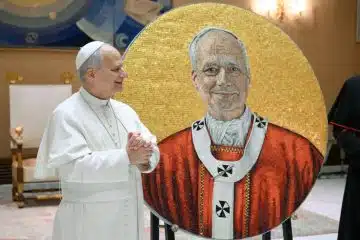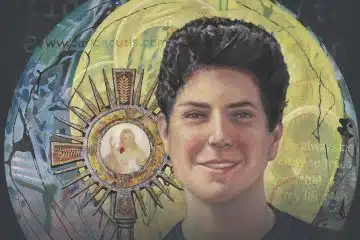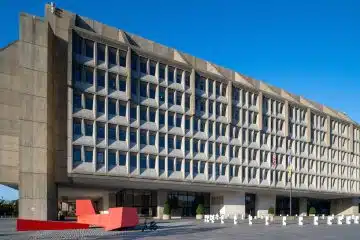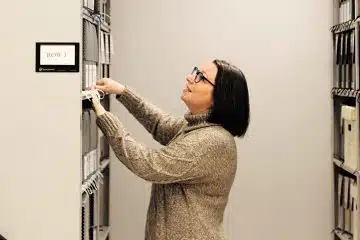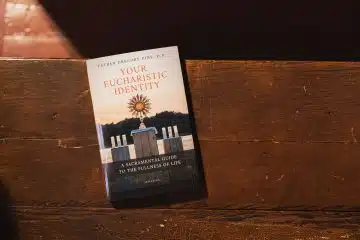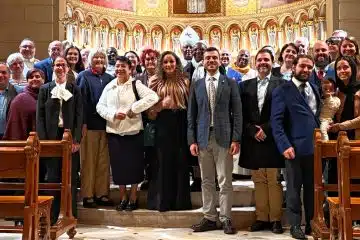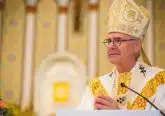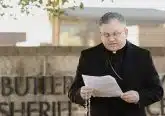Welcoming the Stranger
When Jesus said, “I was a stranger and you welcomed me” (Matthew 25:35), He left His followers a clear command, one that Catholics in the Archdiocese of Cincinnati strive to live out each day.
Across parishes, schools, hospitals, and charities, many Catholics work to meet migrants’ spiritual and physical needs. Tony Stieritz supports much of this effort as CEO of Catholic Charities Southwestern Ohio (CCSWO) and Director of the Archdiocesan Department of Life, Human Dignity, and Charity.
“The Archdiocese of Cincinnati works with migrants on so many levels—spiritually in our parishes and ministries, academically in our schools, and through the works of mercy in our hospitals and charitable organizations,” Stieritz explained.
CCSWO and Catholic Social Services of the Miami Valley (CSSMV) together serve tens of thousands of people from all backgrounds, including migrants and refugees. The mission is not new: “This population has been served by CCSWO since our founding in 1916, and we’re blessed to continue answering the Gospel call to ‘welcome the stranger’ over a hundred years later,” Stieritz added.
Migration: Part of the Human Condition
Migration is not a modern phenomenon. “Since the dawn of humanity, people have migrated to survive. It’s part of the human condition,” explained Stieritz. Today, an estimated 300 million migrants around the world are seeking safety, security, and a future.
The Catholic Church has always shown special concern for migrants forced to leave their homes due to violence, persecution, or extreme hardship. The Holy Family themselves fled to Egypt as refugees, relying on strangers’ mercy to survive—a profound reminder for Catholics today. “We’re called to see the face of Christ in all God’s people; what a powerful appeal to our hearts as disciples!” Stieritz said.
Pope Benedict XVI captured this connection when he said, “In the drama of the Family of Nazareth we perceive the sorrowful plight of so many migrants. The human person must always be the focal point in the vast field of international migration” (World Day of Migrants and Refugees 2007). Migration, Stieritz stressed, is ultimately about human dignity, not politics. “Regardless of one’s viewpoints on the migration process itself, migration does not need to be a political issue,” he said.
While it is ideal for people to flourish in their homelands, the Church affirms that when survival is impossible, people have the right to migrate, balanced with a nation’s responsibility to protect its own citizens.
“It’s imperative that we continue to figure out what a better immigration system should look like. As we do, the Church reminds us that such a system should always include humanitarian pathways for the most persecuted, respecting everyone’s human life and dignity in the process,” Stieritz emphasized.
A just immigration system, guided by Catholic teaching, should honor five key principles:
- The right to opportunities in one’s homeland
- The right to migrate for work and family needs
- The right of sovereign nations to control borders
- The protection of refugees and asylum seekers
- The dignity and human rights of all migrants
Supporting Migrants in the Archdiocese
A variety of groups have immigrated to the archdiocese from other countries; a couple of the recent, higher profile groups being Hispanic and Haitians.
There are multiple areas where groups of Hispanic people have taken up residency, including Cincinnati, Dayton, Hamilton, and some rural communities. Through ministries like the Su Casa Hispanic Center and Immigration Legal Services, CCSWO provides a wide range of support for migrants, including emergency assistance, case management, education, health promotion, legal aid, and bilingual mental health counseling. “Our Su Casa Hispanic Center was founded nearly 30 years ago and assists thousands of clients each year,” Stieritz noted.
Catholic schools throughout the archdiocese are equally dedicated to welcoming Hispanic students, helping them receive a faith-filled and academically strong education. Parishes continue to expand Hispanic ministry programs, offering Masses, sacramental preparation, and spiritual support in Spanish.
The Church’s outreach recently expanded to meet the needs of new Haitian migrants, particularly in Springfield, Ohio. Though Catholic Charities did not resettle these families, they responded swiftly to the community’s needs.
“By request of many local and state leaders, we felt a calling to introduce several of our services to support the community response,” Stieritz shared. These services include job development, English classes, interpretation services, and legal aid.
The archdiocese has offered spiritual support for the Haitian community. Earlier this year, Archbishop Dennis Schnurr personally celebrated a New Year’s Day Mass at St. Joseph Church, and local parishes offer Masses in Haitian Creole. Organizations like St. Vincent de Paul Springfield Council and Catholic Central High School also stepped up to provide critical assistance.
Refugee Resettlement: A Vital Ministry
Formal refugee resettlement is one of the most direct ways the archdiocese serves migrants. By definition, refugees are individuals unable to return to their homelands due to a well-founded fear of persecution based on race, religion, nationality, political opinion, or social group. They make up a small percentage of all immigrants, and are not the same as those who have sought asylum by first crossing the border.
“Almost always, they come after living years, if not decades, in a refugee camp. They must first be recognized by the United Nations and then accepted for resettlement by another country,” Stieritz explained.
The U.S. refugee program, founded in 1980, has long enjoyed bipartisan support. Refugees accepted into the country undergo a rigorous vetting process through multiple government agencies. Last year, CCSWO and CSSMV resettled nearly 700 refugees, primarily from Eritrea, Congo, Syria, Afghanistan, Ukraine, and Venezuela.
Recent federal actions, however, have drastically impacted refugee admissions and resettlement processes. Catholic Charities continues to advocate for protection of the historically bipartisan-supported refugee programs and compassionate policies that reflect the dignity of every person.
What Can Catholics Do?
The need is great, but so are the opportunities to help. “First and foremost, we need to recognize that these people are human beings created in God’s image and likeness,” said Stieritz.
He encourages Catholics to:
- Pray for migrant families and for a more just immigration system
- Build relationships with migrants and refugees in their communities
- Volunteer or donate to organizations like Catholic Charities and Catholic Social Services that do critical humanitarian work
- Advocate for policies that balance security with compassion
Stieritz noted a recent rapid backpedaling on the commitment to help immigrants coming to the United States through refugee resettlement and asylum processes. “A humanitarian pathway has been part of our country from its very founding. It’s a mistake to say that we don’t have an obligation to provide it for those escaping war and persecution.”
At its heart, migration ministry is not just about offering aid—it’s about recognizing Christ in those who come to our doors. In welcoming the stranger, we fulfill the Gospel and become, ourselves, the face of Christ to others.
This article appeared in the June 2025 edition of The Catholic Telegraph Magazine. For your complimentary subscription, click here.


